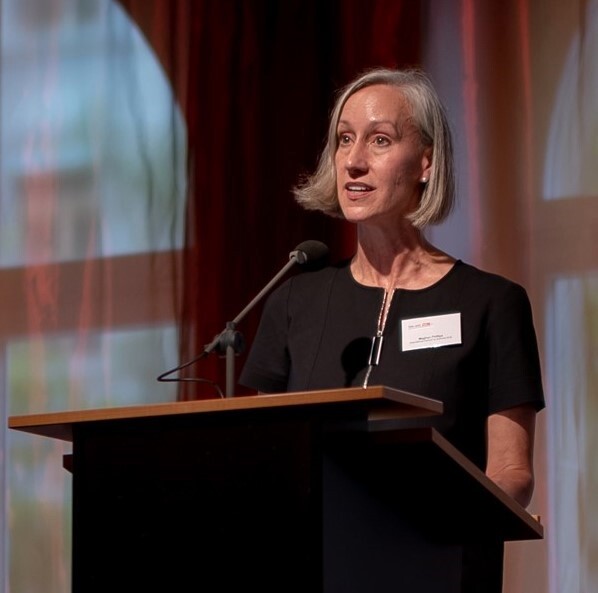The Archives of the Future: AI, Archives by Design, and Archival Values − Celebrating 100 Years of VSA-AAS by Looking Forward
Meg Phillips, ICA’s Vice President Programme, reflects on the insights shared at the VSA-AAS Centenary Symposium, September 16, 2022.

As the Vice-President Programme of the International Council on Archives (ICA), I conveyed ICA’s congratulations to VSA-AAS on its centenary and then attended the celebratory symposium, «The Archives of the Future: Artificial Intelligence, Archiving by Design, and Ethics» on September 16, 2022. This symposium at the Gurten event pavilion provided an excellent overview of the state of the art in advanced technologies and the ethical concerns raised by use of these new tools in archives.
The purpose of a symposium like this one is to learn from each other, but it is also a unique opportunity to pause and reflect on the most important issues facing archives and what those issues will mean for our future. If this can be done in a beautiful setting, so much the better. Not only was that achieved here, but the occasion of VSA-AAS’s centenary provided a particularly fitting reason to think about where we are now and where we hope archives will go.
Archival Challenges
The challenges of managing high volumes of digital records with limited numbers of archivists formed the unstated background of the symposium. This common lament makes tools to speed accessioning, ingest, description, or preservation at scale particularly appealing. Archivists hope for a future where human archivists do not spend untold hours on these tasks or risk adding to unmanageable digital backlogs.
Technological Possibilities, Solutions and Ethics
The «Archives of the Future» brought together a useful combination of expertise and thought leadership from academic, practical, technical, and ethical perspectives. It featured archival leaders in AI, archivists working on innovative approaches to making records archivable from their creation, and software developers engaged in building an AI solution to increase discoverability of multimedia archives. The schedule of talks invited attendees to consider all of these technological possibilities in the light of archival values and archival ethics. How can the tools available now or in the near future be used to achieve archival goals, serving our diverse communities without perpetuating the injustices of the past?
Artificial intelligence shows promise that algorithms can learn to make decisions equivalent to those made by the humans from whose past decisions they learn. Of course, that is both the benefit and the risk. The other part of the archival future that permeated the symposium’s discussions was the need to ensure that future archives are equitable and accessible to everyone. Artificial intelligence’s ability to learn from past human behavior captured in training data makes it particularly vulnerable to perpetuating the biases we are fighting in other parts of our operations. Most of the speakers addressed the ethical challenges raised by AI, and the day concluded with a focus on the archival values that guide us.

Presentations
Jenny Bunn from The National Archives (UK) discussed «AI for Appraisal and Selection.» The result of projects on AI and appraisal at The National Archives and other institutions is an emerging consensus about the sorts of tools, philosophies, and safeguards that will be necessary for archives to accomplish their goals with AI.
In his talk on «Long-term preservation challenges to be improved by AI», Hrvoje Stančić presented results of his 2022 survey, which revealed a wide range of interpretations of key terms. He highlighted the need to provide clear definitions of «large» and «AI» when communicating with archivists in different types of organizations.
Vincent Hoolt spoke about «Archiving by Design in den Niederlanden», describing an approach to building long term preservation capabilities into systems design, leading to greater integration between business processes and the archives.
Bringing a different skill set to the discussion, a team of researchers and developers at the University of Basel presented Archipanion, an AI tool for making multimedia content accessible and finding the «hidden treasure» in multimedia collections.
Wrapping up the day, Carol Couture brought archival values back to the forefront of our minds. He asked us to think about personal values, professional values, and specifically archival values, leaving the symposium with an invitation to let him know what we each think are the five most essential values for an archivist.
Conclusion
During the symposium’s discussion of the challenges of managing large volumes of electronic records with new technologies, ethical issues came up repeatedly. Closing the day with a focus on archival values with their implications for archival ethics allowed us to reflect on who we are as archivists and what we are trying to achieve with the new tools available to us. The whole symposium gave us time to reflect and discuss, with new information and insightful commentary from an interesting combination of speakers. The schedule of the day’s presentations reinforced a key underlying message: we are not passive consumers of technology. By constant reference to our values, archivists will design the archives of the future.
Abstract
- English
- Deutsch
- Français
VSA - AAS’s September 16, 2022 symposium, «The Archives of the Future: Artificial Intelligence, Archiving by Design, and Ethics» gathered researchers and practitioners with a variety of perspectives for a rich discussion of technology and archives. Speakers addressed the promise of AI for managing large digital collections while acknowledging the ethical risks of these tools. Attendees were encouraged to identify their own archival values, a guide as they design the archives of the future.
Die VSA-Fachtagung vom 16. September 2022 mit dem Titel «Das Archiv der Zukunft. Künstliche Intelligenz, Archiving by Design und ethische
Werte» versammelte Forschende und Praktikerinnen und Praktiker mit vielfältigen Perspektiven zu einer umfassenden Diskussion über Technologie und Archive. Die Rednerinnen und Redner sprachen über die vielversprechenden Möglichkeiten der künstlichen Intelligenz für die Verwaltung grosser digitaler Sammlungen und wiesen gleichzeitig auf die ethischen Risiken dieser Werkzeuge hin. Die Teilnehmerinnen und Teilnehmer wurden ermutigt, ihre eigenen archivarischen Werte zu ermitteln, die ihnen bei der Gestaltung der Archive der Zukunft als Kompass dienen können.
Le colloque de l'AAS du 16 septembre 2022, «Les archives du futur. Intelligence artificielle, archivage by design et valeurs éthiques» a rassemblé des chercheurs et des praticiens avec une variété de perspectives pour une discussion riche sur la technologie et les archives. Les intervenants ont abordé les promesses de l'intelligence artificielle pour la gestion des grandes collections numériques tout en reconnaissant les risques éthiques de ces outils. Les participants ont été encouragés à identifier leurs propres valeurs archivistiques, qui leur serviront de guide pour concevoir les archives du futur.

